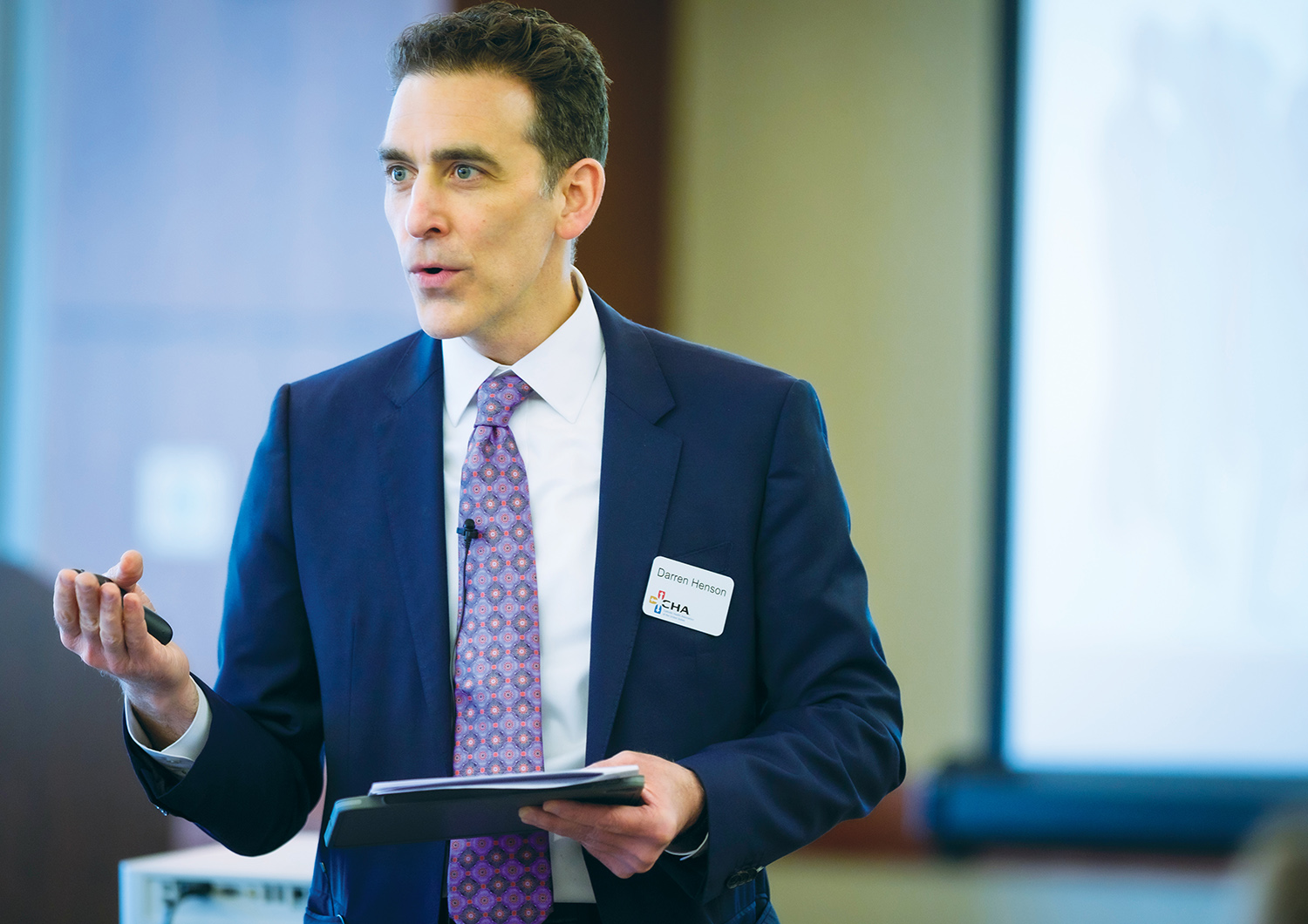
A new guide for forming workers outside the leadership ranks is part of a broader effort by CHA to better understand what tools would be most useful to ministry mission leaders and others who undertake formation work in Catholic health care, and to create more resources to meet those needs.
CHA's new offering, "Ministry Formation for All Workers," provides information and guidance on why and how ministry formation experts can significantly expand the scope of their work, so that all workers can benefit. The 17-page resource is available on CHA's website and in print.
As part of its overall effort to expand formation resources, CHA is exploring how best to communicate and highlight the impact of formation work.
Darren Henson, CHA senior director of ministry formation, says, "We've heard from ministry mission and formation leaders that formation has come a very long way, especially in the last 15 to 20 years. There has been resounding endorsement of our formation work by members. And indications are that ministry involvement in and commitment to formation must continue, in order to meet the hunger and need for formation across the ministry."
Broader exposure
CHA defines ministry formation as the effort to create experiences that invite those who serve in Catholic health care to discover connections between personal meaning and the organization's purpose. Making these connections enables people to articulate the distinctive elements of Catholic health care and integrate those elements into their own work. This integration ensures the ministry can flourish now and into the future, CHA says.
Until recently, CHA's formation work has focused on providing resources and support for forming executive leaders, sponsors and governance members. But, Henson says, as those leaders have been formed, there has been a cascading effect, and those executives and sponsors have called for formation to be provided to workers at other levels.
Henson also says the experience of the pandemic taught organization leaders that all workers need to feel nourished and connected to their work — a need that can be addressed in part through formation experiences.
"There's been a heightened importance of recognizing the gifts of all the workers in the ministry," he says.
While CHA has developed extensive resources for forming executive leaders and others with a fiduciary responsibility for carrying forth the Catholic health mission, vision and values, Henson says CHA recognized that those resources would not be suitable for forming workers outside of the leadership ranks. Formation resources would have to be tailored to different workers in different roles.
Formation for all
To develop "Ministry Formation for All Workers," CHA consulted its nine-member Ministry Formation Advisory Council and other experts in ministry formation. The resulting resource includes an introduction explaining what ministry formation is and how and why it needs to be offered to a wide swath of Catholic health care workers. There's also information on different types of formation experiences, including formal programming and more informal "touchstone" experiences. There are also numerous examples of formation experiences that CHA members have offered to their workers, including orientation sessions, team huddle discussions, blessing rituals, retreats, book clubs and pilgrimages.
Henson says the fact that ministry systems and facilities are providing formation deep into their organizations now "demonstrates that we are at a point of maturation for Catholic health care and the broader church."
He notes that, in line with some of the goals of the Second Vatican Council, the ministry shows how Catholic health values resonate with people of all backgrounds. Formation experiences help people to discover those connections, he says.

Demonstrating impact
Henson notes that CHA's development of "Ministry Formation for All Workers" is just one way the association is responding to mission and formation leaders' needs.
Last year, CHA undertook a study of mission leaders and others responsible for ministry formation. The study revealed that CHA members' ministry formation work, supported by the association, has been very effective. Members exhibit comprehensive depth, breadth and engagement when it comes to formation. Those surveyed said investment in and commitment to formation must continue. When asked what new formation content they desire, many respondents said they most need new materials on spirituality, theological tradition, Catholic social tradition and on inspirational figures. When asked what their formation plans are for the near future, the respondents said they'll continue focusing on leadership development, efforts toward formation of all workers, and integration of Catholic social tradition for associates.
CHA will use this input as it continues to build out its programming and resources.
CHA also is looking into how to demonstrate the impact of formation activity on Catholic health ministries and individuals.
Additionally, the association is assessing and updating the formation resources it offers.
Henson notes that much of this formation work also is related to ministry efforts to nurture its workers' spirituality. He says that CHA's newly released "Inside Out" podcast series, which he hosts, is intended to show people how some Catholic health leaders nurture their spirituality and how their spirituality relates to their work.
"Workers — and especially younger workers — are looking for deeper meaning and purpose in their work," Henson says. "Some CHA members are conducting studies and analyzing data related to potential correlative effects when it comes to formation and worker retention. It's important for us to recognize that our workers are not just body and mind but also spirit, and it benefits us to support their flourishing."
This is the second article in a series on how CHA's mission and sponsorship department is reimagining its work.
"Ministry Formation for All Workers" is available for digital download or print order in CHA's online store.
Further reading:
CHA's sponsorship and mission services department revitalizes its programming
